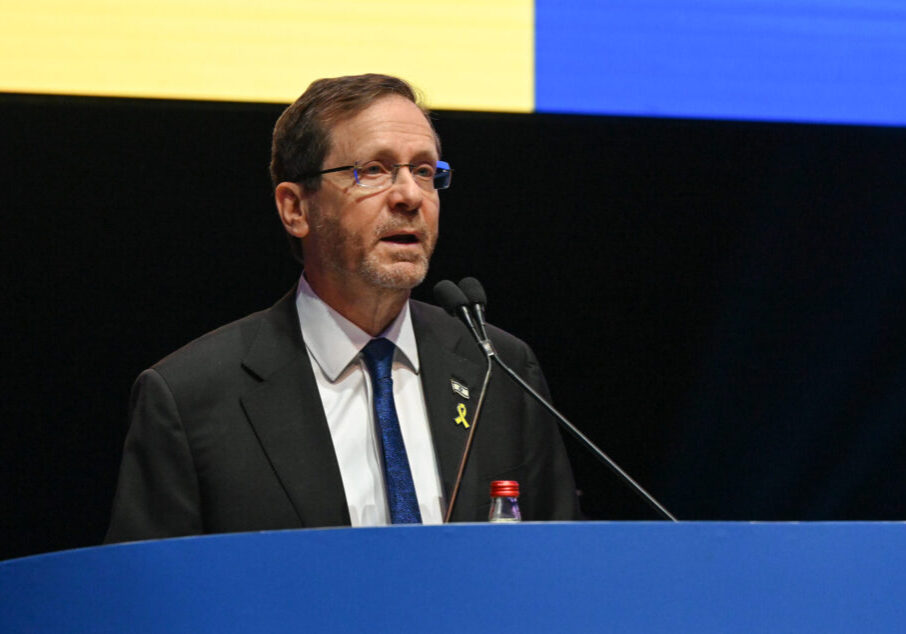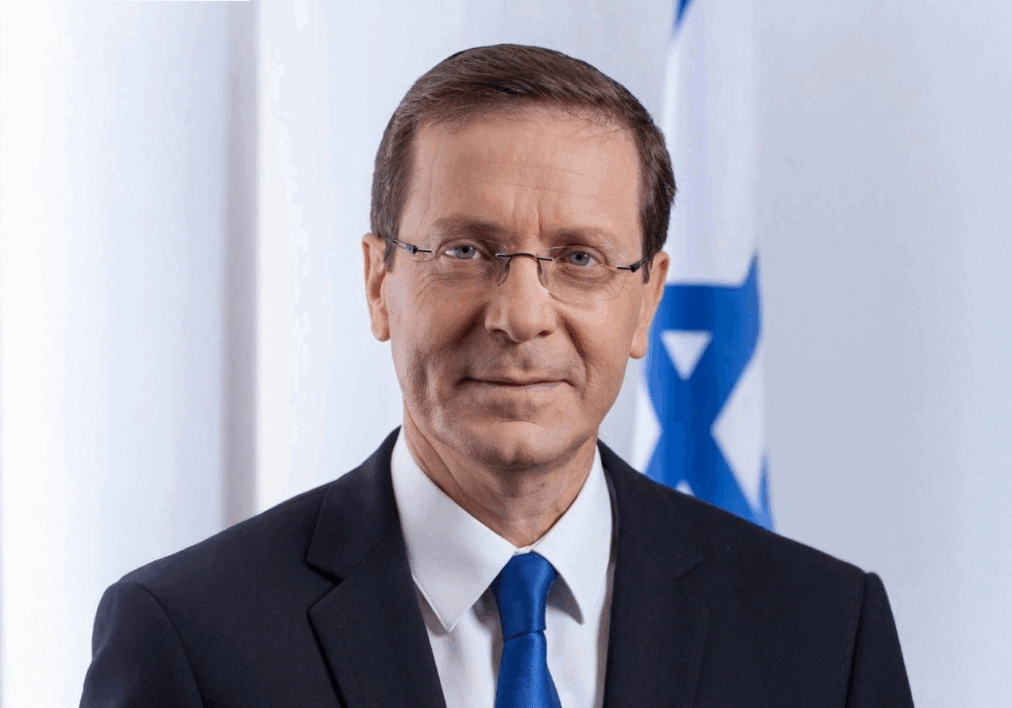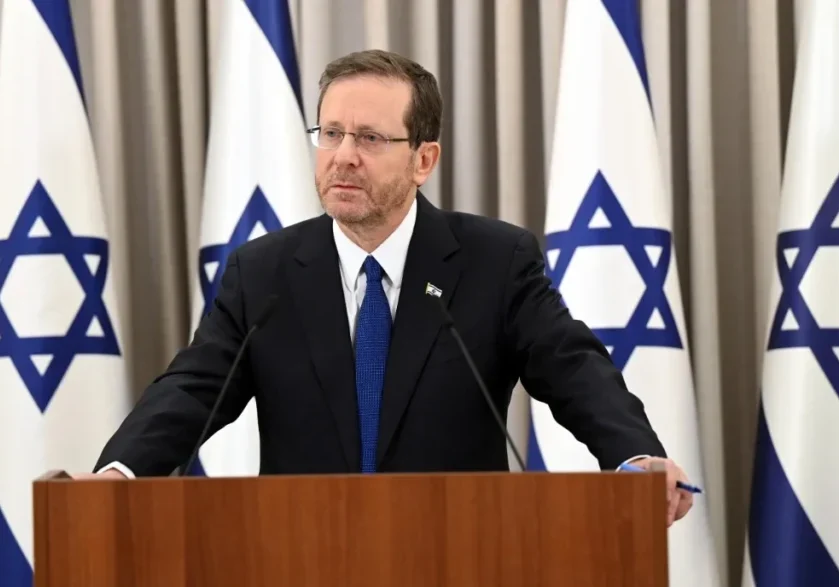Australia/Israel Review
Herzog forges a new role
Feb 28, 2023 | Haviv Rettig Gur
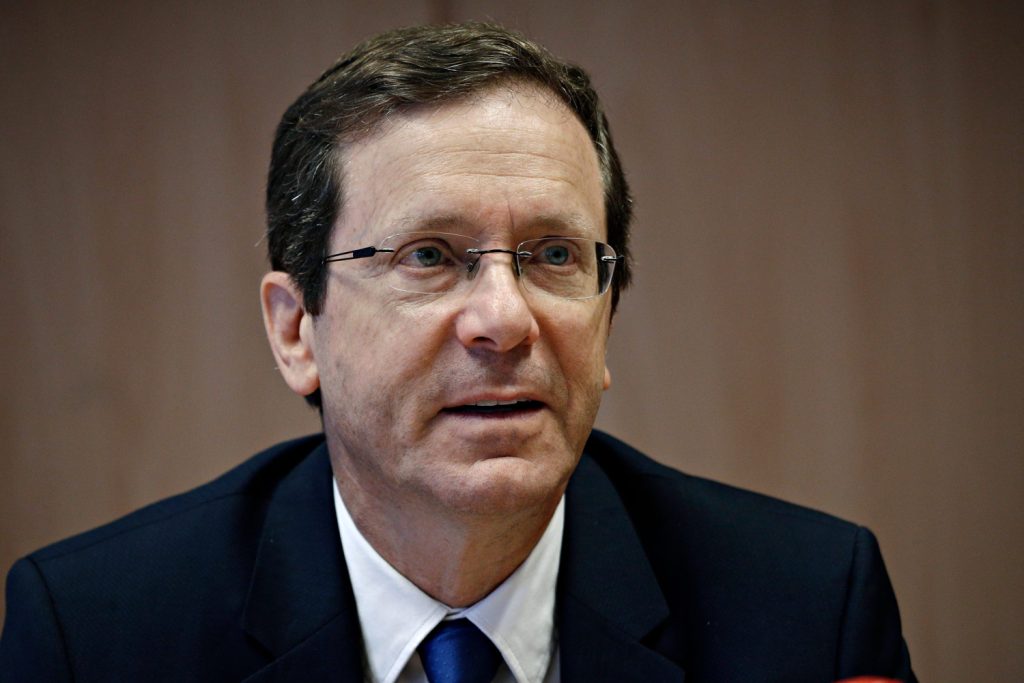
The fight over the Israeli Government’s judicial overhaul proposal can be divided into two periods: Before President Isaac Herzog’s February 12 speech, and after it.
Before the speech, the unforgiving activist base set the tone. Politicians believed they could not afford to give ground. Justice Minister Yariv Levin, Opposition Leader Yair Lapid and many others made a point of rejecting calls for compromise.
Then on Feb. 12, the political script flipped.
The President used his prime time 8pm pulpit to deliver the unpleasant message that both sides had a case and valid reasons for thinking something vital was at stake.
He spoke to the centre-left about the right: “The proposed reform didn’t come from nowhere… [B]oundaries have been crossed on this issue over the years.” Noting the dearth of Sephardi judges in the judiciary as an example, he told the majority-Ashkenazi centre-left that “this pain felt by our brothers and sisters is real, and it is a big mistake to reject or ignore it.”
And to the right he spoke about the centre-left: “There are millions of citizens here who alongside diaspora Jewry and great lovers of Israel around the world see in the reform a real threat to Israeli democracy” and who believe the reform “erases and uproots all checks and balances… [and] that no one will be left to protect citizens from the power of government.”
And precisely because each believed so much was at stake, neither could be allowed to win outright. Neither camp would meekly disappear after such a loss. Victory would only bring further escalation. It was the kind of fight where “when someone wins, both sides lose.”
The speech didn’t spark a mad rush to compromise, but the political vocabulary changed instantly. Politicians who’d spent weeks showcasing their partisan bona fides now declared their eagerness for dialogue. Those who continued to reject dialogue, especially Haredi MKs like United Torah Judaism’s Moshe Gafni, did so angrily, and defensively. The time for compromise, Gafni growled, “was 30 years ago.”
But Justice Minister Yariv Levin’s response was more representative of the general rule. In his statement later that night, he made a point of welcoming dialogue even as he explained why he wouldn’t slow the pace of legislation. His reasoning was simple: He didn’t trust the opposition. They would use the pause to “foot-drag, delay and prevent a real and meaningful reform in the judicial system,” he said.
That he refused to budge wasn’t new; that a justice minister who’d declined to be interviewed for two long months felt a sudden need to explain himself was an innovation. Under the public gaze directed his way by the President, he suddenly understood he needed to show he was rational and open to compromise.
On the centre-left, the process was much the same. The demand to cancel the plan outright transformed into a demand for a temporary pause – Lapid called for a 60-day freeze – to allow for serious negotiations.
In the days that followed, Levin, Lapid, Knesset Law Committee chair MK Simcha Rothman and National Unity party chief MK Benny Gantz all met with the President. The day after the speech, Levin and Rothman publicly called on Lapid and Gantz to meet them at the President’s House. And on Feb. 15, Herzog asked for two private member’s bills related to the overhaul, from MKs Moshe Sa’ada and Moshe Arbel, to be frozen; both MKs agreed.
The point isn’t that one should believe these signals of moderation; the point is that the politicians suddenly felt they needed to broadcast them.
Herzog had “put up ladders for everyone to climb down, and everyone started looking for ways to use them,” was how one right-wing political strategist put it.
Out of the back rooms
There’s a reason Herzog’s speech had that effect, and it points to a surprising new role he has carved out for the Israeli presidency in his 20 months in the position, a role probably unprecedented in Israeli history.
The speech was a carefully planned gambit after several frustrating weeks in which Herzog tried but failed to bring the sides to negotiate behind closed doors.
In a different speech three weeks earlier, on Jan. 24, Herzog described these attempts. In the President’s House, he said, “efforts are being made today – literally today, and every day in the past week, and in the weeks preceding it – the main and possibly only efforts to replace an aggressive zero-sum confrontation with a mechanism that will allow the argument to be managed, and perhaps even resolved for years to come in a way that preserves national unity and the state of Israel as a Jewish and democratic state.”
But those closed-door attempts proved fruitless. In meeting after meeting, compromise proposals were quietly considered but publicly opposed. Each time the parties went in front of the cameras, the willingness to compromise they’d expressed behind closed doors evaporated. Each side knew their political base was angry and worried, and none could afford to appear to be caving under pressure.
So Herzog decided to expand the conversation, to force the politicians to contend with the broader public, which polls suggested favour a compromise. His Feb. 12 speech was designed to drag the back-room dialogue into the open, to make the general public part of the process.
That’s why he dwelt at length in the speech on the specifics of a potential compromise. He urged prohibiting judges from overturning Basic Laws – a demand of the right – while requiring supermajorities to amend those semi-constitutional laws – a demand of the left. He proposed amending the judicial selection process to give a larger share of votes to elected politicians, but short of de facto control by the government as Levin and Rothman are seeking. And so on.
The point was simple: To give the watching public a clear sense of what a compromise might look like, and thereby increase the public pressure to reach a deal. Standing before Israel’s prime-time television audience, he called on Law Committee Chairman Rothman to “consider the principles I’ve proposed here today as a basis for continued discussions in the committee – both for coalition and opposition.”
Bridge building
The Israeli presidency has always been a largely symbolic position. Denied any real power at the country’s founding by Israel’s first prime minister David Ben Gurion, the position has been treated over the decades as a respectable retirement for politicians senior enough to deserve it but not influential enough to vie for the hard power of the prime minister’s chair.
Herzog had led the Israeli left to a short-lived surge at the ballot box in the 2015 election before being ousted as Labor party leader in 2017. He’s a soft-spoken political scion of one of Israel’s most significant political families. (His father was Israel’s sixth president.) Experienced, well-liked, and now sidelined, he seemed a perfect fit for the largely ceremonial Israeli presidency.
But in his 20 months in the position, Herzog has broken the mould, proving that the presidency could be more useful than anyone expected.
One obvious example was his role in the revival of diplomatic ties with Turkey.
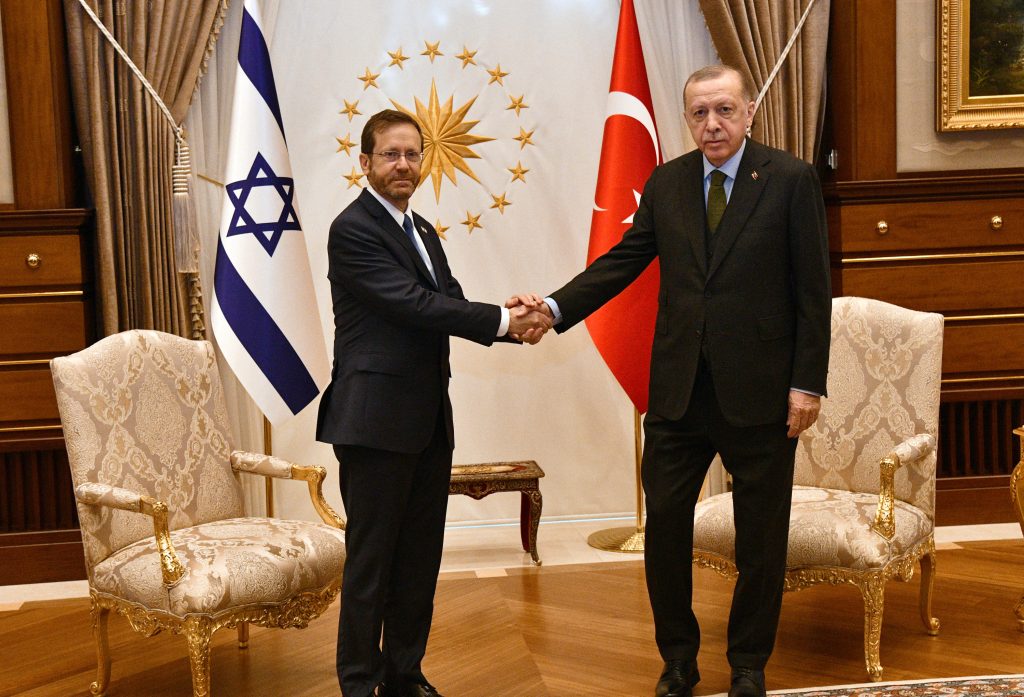
Herzog’s rapport with Turkey’s President Recep Tayyip Erdogan has helped revive Israel-Turkey relations (Image: Haim Zach/ GPO/ Flickr)
In March 2022, Herzog travelled to Ankara for a state visit. He was received with unusual warmth by Turkey’s President Recep Tayyip Erdogan, a sharp change in tone from the years when Turkey was the de facto leader of an anti-Israel, Muslim Brotherhood-affiliated axis in the region.
The visit was first and foremost a calculated geopolitical pivot for both Ankara and Jerusalem. But it was also a result of Herzog’s unexpectedly close ties with the Turkish President, the culmination of a long process of careful relationship-building on Herzog’s part that opened a channel of communication between the two men.
When Erdogan lay bedridden with a bad case of COVID, Herzog called him. When Herzog’s mother passed away, Erdogan returned the favour. When an Israeli couple was arrested in Turkey in November 2021 for photographing the presidential palace, a call from Herzog expedited their release. During tensions on the Temple Mount or when news broke of an Iranian hit squad reportedly targeting Israelis on the streets of Istanbul, phone calls between the two men helped lower tensions in Jerusalem and focus Turkish security attention on the danger in Istanbul.
When the Turkish Ambassador presented his credentials to the President in January, Herzog took pains to broadcast a warmer-than-usual reception. The credentials ceremony is usually a simple photo op; for Ambassador Sakir Ozkan Torunlar, it was upgraded to a joint press statement, a sign of special respect in the language of diplomacy. The only other ambassadors granted the honour recently were those from the US and Bahrain.
While many worked on restoring the Israeli-Turkish relationship through quieter channels, Herzog played an outsized role in clearing the political path to rapprochement. It’s hard to think of another Israeli president who played so central a role in such a strategically significant relationship.
New influence
In part, the quiet new influence of the presidency is a function of the man himself. Once one knows what to look for, a pattern emerges in Herzog’s career. One of his first acts as the newly-elected Labor leader in 2013 was to reach out to the Haredi Shas party seeking collaboration in shortening the lifespan of the Netanyahu-Lapid-Bennett Government formed that year. In the 2015 election, his ability to build bridges forged the Zionist Union alliance that delivered for the left its last meaningful ballot-box success with 24 seats.
But it isn’t just Herzog. As Israeli politics are overtaken by sectarianism, the country is suddenly discovering a previously unexpected role for its ceremonial president.
The President’s House, Herzog said on Jan. 24, “is probably the only place today that manages to hold the trust of the sides and serve as a safe shelter for substantive dialogue in this fight.” Israel has never needed such an institution more. Israelis “haven’t just forgotten how to agree, we’re not even managing to argue. We must strive for broad agreements, not victories. Thinking of this as a zero-sum game is a threat to us all, because the side victorious today will be defeated tomorrow, and vice versa. Neither will enjoy sustained and permanent protection for their values.”
In using his traditionally dormant office to such powerful effect, Herzog inadvertently makes a larger case about the current constitutional reforms: That a permanent path out of the crisis may lie not merely in recalibrating the existing institutions, but in bringing forth new ones, new bodies with powers tailor-made to force compromise in an increasingly partisan and belligerent political age.
Haviv Rettig Gur is senior analyst at the Times of Israel. © Times of Israel (www.timesofisrael.com.), reprinted by permission, all rights reserved.
Tags: Isaac Herzog, Israel, Turkey




